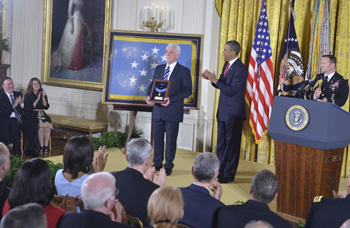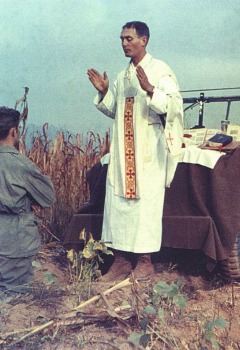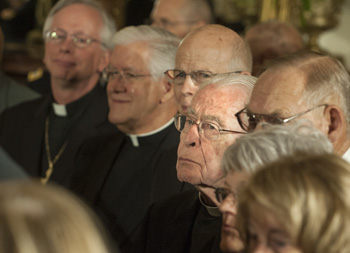
April 12, 2013

President Barack Obama yesterday awarded the Medal of Honor for conspicuous gallantry to Father Emil Kapaun, a U.S. Army chaplain and Catholic University alumnus, who risked his life to give spiritual comfort and medical aid to his comrades while under enemy fire in the Korean War.
With First Lady Michelle Obama in attendance, the president presented the medal to a visibly moved Ray Kapaun, the late chaplain's nephew. Other Kapaun family members also attended the 22-minute ceremony in the East Room at the White House.
A priest of the Diocese of Wichita who earned a master's degree in education at Catholic University in 1948, Father Kapaun is one of three priest alumni whom the Church is considering for sainthood. The others are Archbishop Fulton J. Sheen and Rev. Theodore Daniel Foley, C.P.

Father Kapaun and Father Foley have been named Servants of God, the first step toward possible sainthood. In June 2012, Pope Benedict XVI declared Archbishop Sheen venerable, which is the second phase in the process of consideration for sainthood.
The medal honors Father Kapaun's extraordinary heroism in November 1950 while serving with the 3rd Battalion, 8th Cavalry Regiment, 1st Cavalry Division during combat operations at Unsan, Korea, and as a prisoner of war.
Standing near a light-blue Medal of Honor banner decorated with gold stars, Obama noted that this year marks the 60th anniversary of the Korean War. "Among the homecomings was a group of POWS who appeared carrying a large wooden crucifix. They had spent months working on it, using firewood and radio wire, as a tribute to their friend, their chaplain and their fellow prisoner, Father Emil Kapaun."
Father Kapaun, who used to sneak out of the POW barracks to get food for his fellow prisoners and once pushed aside an enemy soldier getting ready to execute a comrade, didn't survive the war. He died at the age of 35 in a POW camp in Pyoktong, North Korea, in May 1951.
He was remembered at the ceremony as a man of faith known for his courage, humor, and down-to-earth manner. Born in Pilsen, Kan., in 1916, Father Kapaun served as a chaplain in both World War II and Korea.
The medal citation noted that "when Chinese Communist forces viciously attacked friendly elements, Chaplain Kapaun calmly walked through withering enemy fire in order to provide comfort and medical aid to his comrades. When they found themselves surrounded by the enemy, the able-bodied men were ordered to evacuate.


"Chaplain Kapaun, fully aware of his certain capture, elected to stay behind with the wounded. As hand-to-hand combat ensued, he continued to make rounds. As enemy forces approached the American position, Chaplain Kapaun noticed an injured Chinese officer amongst the wounded and convinced him to negotiate the safe surrender of the American forces.
"Shortly after his capture, Chaplain Kapaun bravely pushed aside an enemy soldier preparing to execute a comrade, thus saving a life and inspiring all those present to remain and fight the enemy until captured."
The audience at the ceremony included representatives of the Diocese of Wichita, which has led the investigation into the life of Father Kapaun and in July 2011 concluded its research on behalf of the cause to beatify and canonize him. The diocese is awaiting notification from the Vatican's Congregation for Saints regarding the cause.
On Friday, April 12, the Pentagon will induct Father Kapaun into its Hall of Heroes at a 1 p.m. ceremony.